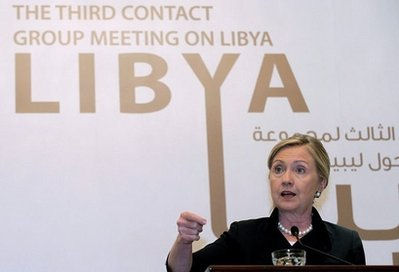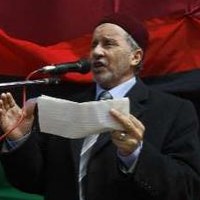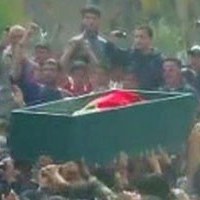![]()
Thu, June 09, 2011 | Debka.com

US Secretary of State Hillary Clinton speaks during a press conference at the end of the third meeting of the International contact group on Libya in the Emirati capital of Abu Dhabi. Key powers met Thursday to map out what Washington calls an inevitable "post-Kadhafi Libya" as more signs emerged the strongman wants out and more than one billion dollars flowed toward the rebels. (AFP/POOL/Susan Walsh)
Moscow opposes Western anti-Syrian motions because of Tripoli bombing
A DebkaFile report:
Russia is opposed to any UN Security Council resolution on Syria,” Russian Foreign Ministry spokesman Alexander Lukashevich told journalists at a briefing in Moscow Thursday, June 29, after the UK, France, Germany and Portugal moved to condemn Syria’s violent crackdown on anti-government protesters and demand humanitarian access to the situation there.
The new resolution demands that President Bashar Assad end the violence and lifts the siege of protest cities. It also calls for an arms embargo on Syria. US Ambassador Susan Rice, who did not co-sponsor the draft, dismissed the comparison between Syria and Libya.
Wednesday, June 8, the NATO defense ministers meeting in Brussels failed to agree on the expansion of operations against Muammar Qaddafi or persuade more alliance members to join.
Debkafile’s military sources add:
The cost of the war in Libya is constantly rising and beginning to weigh heavily on the defense outlay and state budgets of the US, Britain and France, all of which are battling deep economic crises. Our sources learn that the three governments are contemplating dipping into the frozen funds of Muammar Qaddafi’s regime estimated at over $45 billion — possibly $34 billion in American banks alone — to defray some of the costs.
The relentless air strikes over Tripoli alone cost about $25 million per day.
The use of those funds will be presented as necessary to relieve the hardships of the Libyan population living under rebel rule and suffering attacks from Qaddafi’s forces.
In a statement issued on Thursday morning, June 9 (Wednesday night in the US), Chairman of the Senate Banking Committee Tim Johnson said,
“The ongoing violence in Libya has disrupted the economy and left far too many innocent Libyan citizens struggling to simply put food on the table.”
Debkafile’s military and intelligence sources say the coalition ran into financial difficulties because they missed realistically evaluating Qaddafi’s financial, military and political strength before launching operations against him in March. They are therefore running out of steam after four months without removing him from power. Some Western capitals and NATO circles are talking about prolonging the war until the end of 2011 or the beginning of 2012.
In March, we reported that the Libyan ruler had stashed most of his financial assets in cash, estimated at nearly $1 trillion, in underground hiding-places in the Libyan desert. The war’s planners, especially in London and Paris, declined to take this into account because they were sure they could topple him in days or, at most, weeks. His private fortune would then have been invested in building the New Libya.
This plan has faded from view.
Even now, under the continuous pressure of NATO bombardments, Qaddafi has a plentiful cash flow to fund his operations. The tribal chiefs in areas where his money is hidden remain loyal to the Libyan ruler and take good care of his money because it keeps them in funds and buttresses their own tribal power.
The West, in contrast, is struggling against a shortage of funds which has become one of the main obstacles to sustaining the war effort against him.
Wednesday, June 8, NATO tried ratcheting up the war effort in two ways:
Air assaults on the government compound in Bab Al Aziziya, Tripoli, were intensified to some 80 strikes in two days, a pitch unprecedented so far. Its object was to trigger a mutiny in the army units still loyal to Qaddafi and an uprising among the capital’s more than 3 million inhabitants.
This did not happen: The rockets landed mainly on empty buildings and bunkers, long evacuated after the first bombardments. The people who paid with their lives, therefore, were a few guards and passersby.
The thunderous assault on Tripoli formed the background to the NATO defense ministers meeting in Brussels Wednesday.
The twenty member-governments which have stayed out of the military action so far refused to be drawn in, in the face of the strong pitch made by NATO Secretary Anders Fogh Rasmussen. Sweden, a non-NATO participant, announced it was scaling down its involvement.
US Defense Secretary Robert Gates, in his last appearance at an alliance meeting, pointed to five countries that Washington would like to see play a greater part in the war: Germany, Poland, Turkey, Holland and Spain. But their defense ministers turned him down too.
Diplomats who took part in the meeting said that some of the participants openly admitted a “certain fatigue” beginning to set in among the eight NATO states committed to the war. Yet the Brussels meeting left those eight governments, led by Britain, France and Italy, to soldier on unaided in the drive to overthrow Qaddafi.
Despite US Secretary of State Hillary Clinton’s confident assertion that Qaddafi’s days were numbered, the downbeat atmosphere in Brussels infected the meeting in Abu Dhabi Thursday, June 10, when coalition foreign ministers committed to the Libyan operation met to discuss the fate of post-Qaddafi Libya.
While the participants were voluble in their support for the rebel cause, very little financial aid was put on the table.
Egypt was invited to join the group but declined: Cairo has its hands too full with grave domestic difficulties to be available for any role in the war on Qaddafi.
All the same, debkafile’s military sources report that this week saw a noticeable decline in Qaddafi’s military and political situation. Heavy NATO bombardments are managing to knock out some of his armies’ military and logistical supplies, while Russia and the countries of the African Union which backed him until now are now saying openly that it is time for him to go. They have embarked on diplomacy for ending the conflict and removing him from power.
Moscow has its own fish to fry: it is in the process of teaching the West a lesson that it will not be allowed to go off on its own and bomb an Arab capital like Tripoli without a UN Security Council mandate, which Russia says NATO has long overstepped. As holder of a Security Council veto, Russia has cited NATO’s “inclusive bombing of Tripoli” as grounds for blocking the new Western draft resolution condemning another Arab government, Syria, and any Western intervention against the Assad regime — even through the International Atomic Energy Agency which Thursday referred the dossier on the plutonium plant Israel bombed four years ago before it was finished.



 RSS
RSS










Latest Comments
Hello Mike, Thank you for your positive feedback to the article. I felt there wasn’t too much critical analysis of ...
Thanks for this considered and well constructed article. A follow up article on the manner in which the editorial contro...
THE CLUELESSNESS OF CLAIMING THAT OBAMA'S MIDDLE EAST POLICIES WERE A FAILURE CANNOT BE FURTHER FROM THE TRUTH, WHAT THE...
As long as Obama is the president of the usa do not trust the us government......
Thank you for an good read....